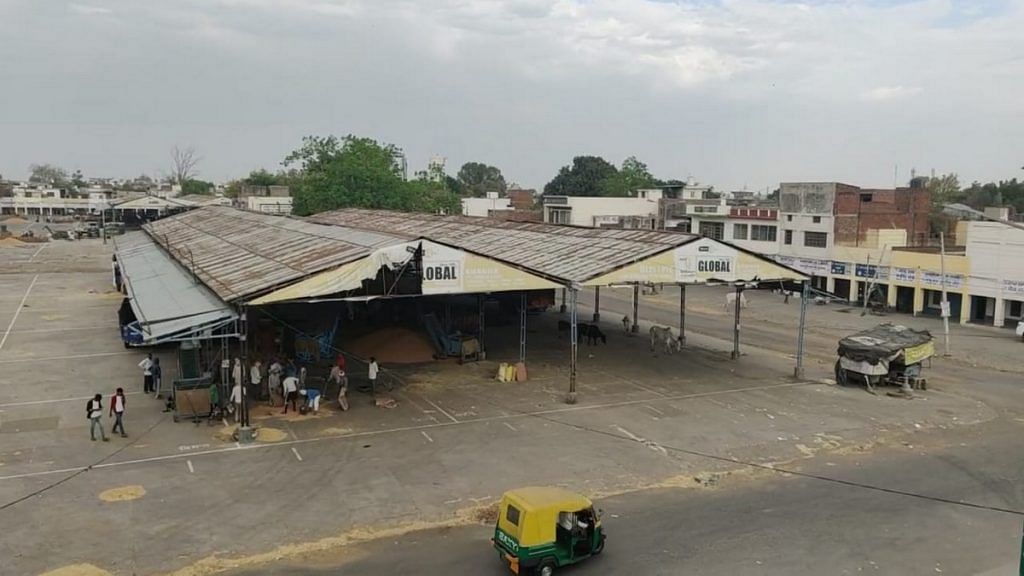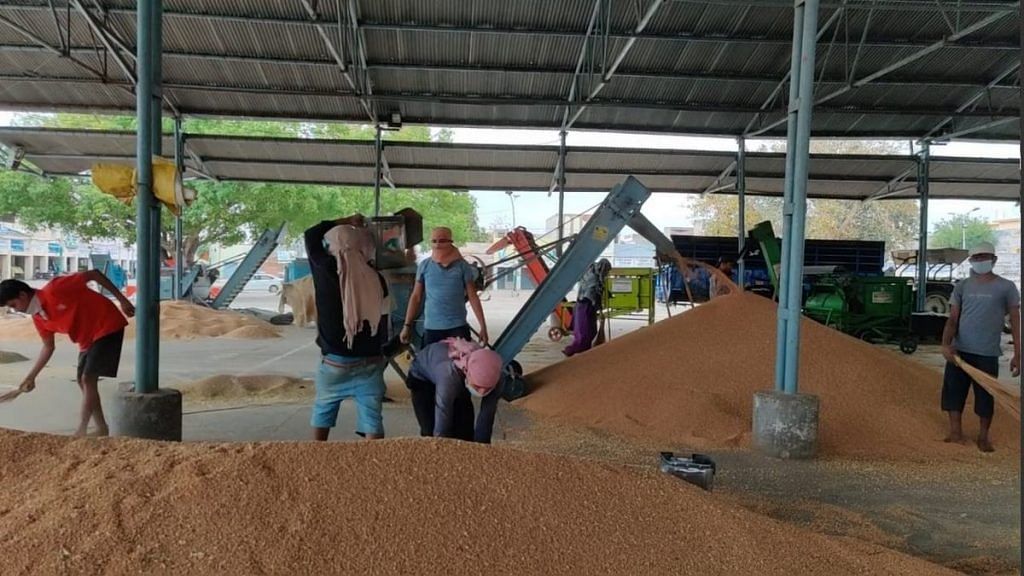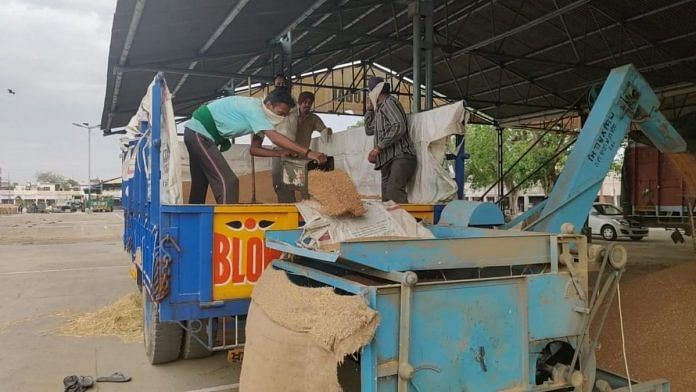Khanna (Punjab): At the Khanna Mandi in Punjab’s Ludhiana district, the low thrum of a thresher echoes through a large shed, as it beats out the seeds from the harvested wheat crop. It’s a sound one wouldn’t usually hear so distinctly at Asia’s largest grain market, which is spread out over 51 acres, and has been operating since 1967.
Khanna Mandi stands almost empty, but a few slots are occupied, signalling its return to life in the midst of the wheat harvest season, which has started amid the nationwide lockdown to curb the spread of Covid-19.
The harvest season, which begins in mid-April, lasts for roughly one month. And there is a lot of wheat to process — last year, Punjab produced 131.70 lakh metric tonnes of wheat, according to the Punjab Mandi Board.
This time, as the season drew near, farmers in Punjab were growing increasingly anxious about the lockdown, as any delay in the process could risk their crop going to waste. However, the Punjab government put some relaxations into place, and began procuring wheat on 15 April.
Punjab Chief Minister Captain Amarinder Singh had tweeted on 16 April that he would take steps to ensure lifting of the grain and payments takes place on time.
Procurement activity has resumed now, though not without some new rules and restrictions. The first of these is a token or e-pass system the state government has announced, to ensure the World Health Organization guidelines on social distancing are maintained.
Also read: No labour, no transport, no demand: UP small farmers’ troubles pile up under lockdown
The procurement process
The Government of Punjab carries out the procurement process on behalf of the central government and the Food Corporation of India. About Rs 26,000 crore is disbursed among farmers in this period.
According to Vishwajit Khanna, Punjab’s Additional Chief Secretary, Development, there are roughly 22,000 registered commissioning agents in Punjab and 5.5 lakh farmers.
While the ratio of agent-to-farmer varies greatly based on how big their shops are, each agent handles 1,600 farmers on average.
The token system and why govt thinks it will work
The Punjab government has made a portal for the Punjab Mandi Board, which issues tokens or e-passes to the market committee. The market committee then distributes these to commissioning agents who, in turn, give them to the farmers.
This system was put into place on 14 April by a 30-member control room at the Punjab Mandi Board, in a bid to regulate the flow of wheat arrival in mandis and avoid crowding.

While there are more than 1,800 procurement centres in Punjab, the government added 1,820 more this year by converting the yards where paddy is stored, to reduce crowding.
Explaining the process of what happens at a procurement centre, Khanna said: “It is a three-day cycle. Wheat takes a day to clean, weigh, pack, and then 48 hours to be lifted.” This is why commissioning agents are being issued tokens after a gap of three days.
“Based on the data from last year, we know which commissioning agent has handled how much load, according to which the token is issued,” Khanna said. The commissioning agent, in turn, talks to farmers and gives the appropriate number of coupons to those who have harvested their crop.
The state government also posted a video on Twitter explaining the process for all farmers to ensure “a hassle free procurement”.
An informational video on the process of Wheat Procurement for all our farmers, Chief Minister @capt_amarinder Singh led Punjab Government urges to watch the video and share it with maximum farmers in order for a hassle free procurement in this crucial hour of #Covid19. pic.twitter.com/GH8XYiy8Rx
— Government of Punjab (@PunjabGovtIndia) April 19, 2020
Ravi Bhagat, secretary of the Punjab Mandi Board, said they are counting on the new system because it’s “fair”.
“The reason why this system will work is because it is completely transparent and fair to everybody. It does not differentiate between who can come and who cannot, since it is based purely on mathematical equations derived from last year’s data on how much load a commissioning agent has handled,” Bhagat said.
“We don’t differentiate between landowners or commissioning agents being aligned with any political party. No favouritism is taking place,” he said.
“With this system, farmers don’t have to wait a single day. This system has ensured that the agrarian economy continues to run despite a nationwide lockdown.”
As of 20 April, Bhagat said, as many as 2,63,440 passes have been issued, and 13,04,519 metric tonnes of wheat procured.
In a few videos released by the state government, farmers from districts like Patiala and Jalandhar claimed all their wheat was purchased on the day they came to the mandi.
Social distancing at the mandi
There are, of course, problems that even the new system cannot totally surmount, such as the necessity of social distancing, which is difficult to follow while processing the grain.
A week ago, the floor of the mandi was painted to divide the area into 30 feet by 30 feet squares for heaps of 50 quintals each. The square was further divided into four parts — bori (sacks), kanak (wheat), kisan (farmer) and pakha (thresher).
Each commission agent has been allotted a square where the landowner (zamindar) he is responsible for dump his produce. But during the hour-long process that takes place with roughly five labourers employed at one machine, social distancing does not seem possible due to the nature of the work.

While some commissioning agents have provided their labourers with masks, sanitisers and even gloves, agent Sumeet Gupta admitted a one-metre distance is difficult to maintain while doing the work.
“With the kind of procedure that is followed, it is difficult to maintain social distancing. This is not a one-man job,” he told ThePrint. “We try to sanitise the workers every time they shift work from one trolley to another.”
Seasonal labourers missing
Sanjay Ghai, former president of the Khanna Mandi, sat in a plastic chair, wearing a worn out-looking mask in front of his shop, where labourers were processing wheat, and spoke about the paucity of labourers due to the lockdown.
“Earlier, labourers would come from other states such as Uttar Pradesh and Bihar, but now that isn’t the case because all modes of transport have been halted due to the lockdown. We are using local labourers, so the work that used to be done by 20-25 labourers is now being done by 10 labourers,” Ghai told ThePrint.
As a result, work has slowed down in the mandi. Procuring the crop from the field, bringing it to the mandi and then packaging it in sacks used to take 20-25 days, but with the lockdown restrictions, it is now estimated to take about 50 days.
The other problem is that most of these labourers are less skilled than their UP and Bihar counterparts, and commissioning agents and zamindars feel they are wasting precious time and resources.
Commissioning agent Gupta said: “We really have to spend a lot of time trying to explain everything to the unskilled labourers. Our usual seasonal labourers didn’t need the help; we could trust them.”
Also read: How lockdown is disrupting the village economy in UP, one farmer at a time
Zamindars’ concerns
Zamindars such as Pavitra Singh and Jagmeet Singh aren’t happy with the new system. Dressed in all-white kurta pyjamas and wearing handkerchiefs tucked into their turbans as masks, they said they were given five tokens for 19 April, which would allow them to fill five trolleys (loads vary from five to ten tonnes). But they were ready by 17 April, asking for an earlier date and tokens at more frequent intervals.
“The time for the validity of one token should be more than 24 hours; it should be 36 hours so work can actually be completed,” Jagmeet told ThePrint.
Under normal circumstances, zamindars like them would bring their entire crop load in 10 days from the farm to the mandi and get it processed. But the token system does not allow that. Jagmeet, who owns 10 acres of land, is forced to store some of the crop in his home, and the space is fast decreasing.
“As opposed to getting five tokens every three days, we want two tokens daily,” he said.
Pavitra added: “We don’t trust the new labourers, so we stay up until 3 am sometimes, finishing the work they couldn’t do.”
This comes on top of the problem of lower yield due to weather. Jagmeet explained that the yield is less than usual. “When weather conditions are ideal, the land would yield 20-21 quintals per acre, but now it’s down to 15,” he said.
Labourers’ woes
There are still some labourers from UP and Bihar in Khanna, who got stuck because of the lockdown. One of them is Vijay Singh from Bihar, who tried hard to leave, but to no avail. Now, his concerns have only compounded.
“Nobody is providing us with food or water. It is very difficult, but we try to manage it somehow with the little money we earn,” said Vijay, whose income is sporadic as the harvest season has only just begun. Labourers like him only come to the mandi when their employers get tokens.
While the commissioning agents ThePrint spoke to said the mandi and its workers are sanitised regularly, Vijay said the area was last sanitised two days ago.
Another labourer, who didn’t want to be named, arrived in Khanna from Bihar on 1 March and has been here since. “We have been given instructions to cover our faces and maintain distance. We try to do it as much as we can. But not everyone has that luxury,” he said.
Also read: ‘We have got it under control’: How Ajmer has kept its Covid-19 count at just 5



